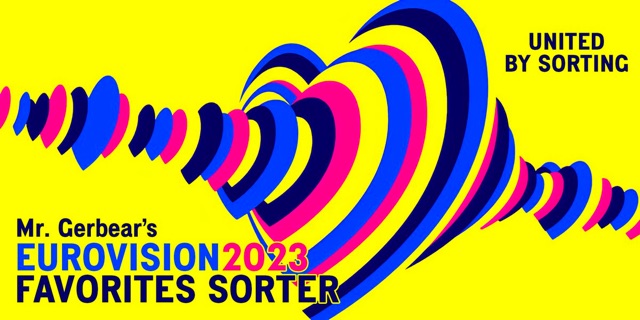Since the second Eurovision Song Contest in 1957 the results have provided an ordering of the songs that is revealed to the public. The methods have changed over time and since the televote was introduced in 1997, viewers at home have had an opportunity to weigh in on their favourites.
Current Eurovision scoring means each country only awards points to the top 10 songs as selected by their jury and televote. For televoting, many viewers are likely to only vote for one or a small number of songs, focusing on the ones that they like the most (and they’ll be conscious of the price of each televote).
In the current system, the jurors have to rank all of the songs. And that brings the question of how to differentiate between songs where you might not have a very strong opinion, or where the songs are hard to compare because they are very different in style.
Why Rank Songs Anyway
Eurovision fans go all-in for ranking all the songs. Part of the build-up of the season is fans on social media sharing their latest ranking as each song gets chosen, with some fans able to get their ranking done phenomenally quickly.
This ranking process can be applied to any selection of songs. The fandom has come up with a whole range of criteria to select songs and quite a few ways of aggregating people’s individual rankings. But before you get to that stage, how do people rank the songs to start with?
How Hard Is It To Be Objective?
It’s incredibly hard to be objective.
Everyone has biases, conscious or unconscious. Perhaps you already know and like an artist so you’re predisposed to like their new song. Or perhaps the song is from a genre that you’ve just never enjoyed, so even if it’s working for many other people, you just can’t get into it.
In my experience, most people are interested first in just working out what they personally like, and for that, many of these biases are just part of our personal taste.
But it can be tricky when your ranking has a different aim. If you’re trying to predict the success of a song in the Eurovision Song Contest (or if you are lucky enough to get asked to be a juror in a national selection or the big event itself), it’s helpful to understand your own biases and be able to put them to one side.

Mr Gerbear’s Eurovision Sorter Promo Postcard for 2023 (Mr Gerbear / BBC)
How Do You Do It?
With all that said, how do you actually do it? Unsurprisingly, everyone is slightly different; so I asked some of the Insight family their approach. But I’ll start with how I do it.
Harriet Robinson (@h_geeky).
I have a scoring approach that works in a fairly standalone way for each song, so it’s easier to build a ranking from any selection of songs. My approach continues to evolve and my current method involves a breakdown across four criteria: song, vocals, staging/performance (for live performances) and “bonus” points.
The core is the song – I score out of ten for this, and the other categories adjust up or down from there. My song score captures my feelings about the overall sound, melody, harmonies, and instrumentation, and the lyrics can play a role here too. Ultimately it comes down to how much I would like to listen to the song again (8/10 and higher means it’s going on a playlist).
For vocals it generally comes down to timbre, which is very much about my personal taste. And of course for live performances staying in key definitely helps avoid a negative score.
My approach to staging and performance has changed a lot over time. I vary between whether it contributes to my overall score or whether it’s just a tie-breaker, and I’m increasingly directly considering performers’ stage presence as well as choreography, effects and other features.
The “bonus” points often reflect where the theme of the song or something about the performer particularly stands out, for better or worse. Some songs lose out here if I really dislike the lyrics but in a way that feels separate to the overall sound of the song.
I tend to jump into scoring a song pretty quickly, sometimes too quickly. When we’re deep in National Final season with lots of songs lined up, I sometimes find myself rushing to judgement in the first 30 seconds and have to remind myself to slow down. But no numbers are set and final – there’s always an opportunity to reappraise a song later.
Ilaria Pagano (@quantapacevuoi)
First of all, I never start to make a complete ranking before April. I need a lot of time to get into the songs and I don’t like to rush things, albeit having a rough idea of my Top Five and least favourites often right from the start.
I write down all entries in a notebook as they get selected, so when it’s time for me to finally rank them I take a good look at the list and start dividing it into brackets. Having my top 3 or 5 already clear in my mind, I write it down and then move onto the opposite end: I figure out my bottom 4-5 and slowly move upwards, ranking each mini set of songs up until I’m done.
I can boil down my criteria to one parameter, and it’s how the song makes me feel. The more emotions a song makes me feel, the stronger they are, the higher it will rank. This is also how I find my winner: there’s always that one song that gets me the most, that reaches within me deeper, and as Vasil (North Macedonia 2021) would say, this is how I know that’s the one.
Martin Bishop (@ThankYouEurope)
When I was asked to contribute to this article, my first thought was that I’d have to sit it out. I don’t really go big on rankings. I’m not the sort of person who can tell you who their third place in 2018 was and didn’t think I had a particular method.
However, I don’t go through Eurovision season as a completely impartial observer. Once we have a few songs, I will have a favourite, then another and another and will build up a rough top 5 in my head. There will normally be something in there to satisfy my instinctive biases. If there’s a good indie rock number, they’ll probably get a place. I’m also more than partial to a well-executed “fun” entry. If I’m completely honest with myself, I tend to resist putting a fun entry at number 1, because I want to tell myself I have sophisticated tastes and don’t spend entire days singing “Poe” to myself.
It will only be later in the season, sometime in April, that I commit to creating a full ranking. For this I will turn to Mr Gerbear’s famed sorter. It takes me ages. I need to commit a full day to go through dozens of pairings I cannot choose between. I’ll have to listen to those pairs back to back, sometimes more than once. The most important thing I’m looking for is how much a song makes me happy and do I want to listen to it again. At the lower end, I’m likely to penalise a song for poor lyrics, especially when a song has nothing to say.
I guess I do have a method, actually. By the way, I looked up my 2018 sorter results and the answer is Ukraine.
Alesia Michelle (Alesia on YouTube)
When I’m analyzing a Eurovision Song Contest entry, I look at a myriad of criteria. However, I think it is important to note that the criteria I used to personally rate songs is different from what I use to make predictions. With predictions, I take a bit more of a data-driven approach noting past performance and analyse the trends in televote and jury scores.
When developing my personal rankings I start by categorizing the songs based mainly off of what I enjoy listening to the most. In contrast, when I am picking my predictions I categorize the songs by genre. Yes, Eurovision is a television show and the visuals matter but the entire show is underscored by the song.
All in all, I look at vocal ability/dynamics presented. I also consider how unique and/or risky the song’s structure, instrumentation, and presentation are. If a song feels too generic or derivative, I instantly “deduct points”. I wouldn’t say I prefer any genre over the other, but I always prefer risk and different.
But What About The Public?
So those are four fans and a range of approaches to ranking. Some of us like to take some time to mull things over, others get started early. And while we might look at objective features of the songs, our personal rankings come down to our subjective feelings.
What unites us, is that we’re all Eurovision fans who will listen to the songs many times over the season, unlike many of the viewers and voters in the contest itself. We have the luxury of time and a range of apps and tools to help us work through some tricky comparisons.
The public get one run through the songs, with 45 seconds between them, plus some recaps. So they won’t have as long to mull over their voting choices. But ultimately whether it’s based on our first listen or our 101st, we’re all looking for the songs that make us feel something and that we want to hear again. And hopefully, we’ll find them, even if they don’t end up winning the contest.









